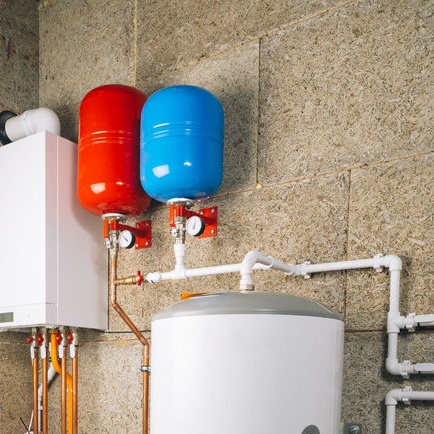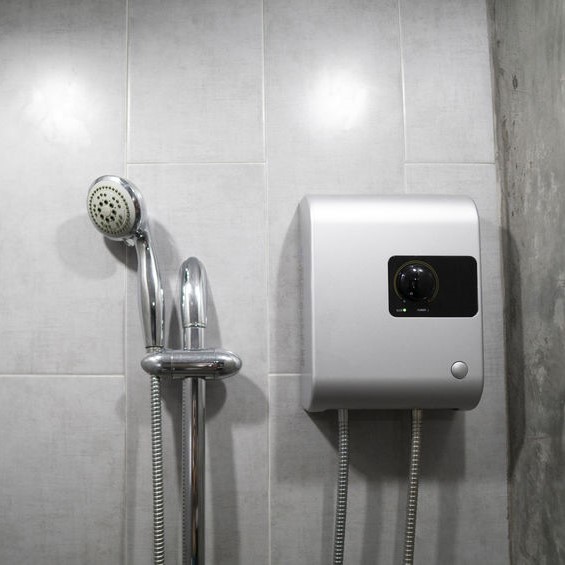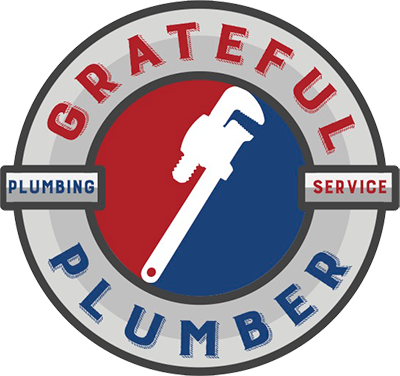
Water heater options
If you’re needing to replace your current water heater, or you know the time is coming soon, you’re probably considering a tankless water heater. While this is the latest innovation, along with PEX, that is taking over the home repair industry, is a tankless water heater the right choice for your home?
We’re going to answer some basic and commonly asked questions about this very topic, because there is more to having a tankless water heater installed than the traditional water heater. Let’s start with this question, “what are the pros and cons of tankless hot water heaters?”
A tankless water heater is more energy efficient than the traditional water heaters because they don’t continuously heat and reheat the water. Instead, they instantly generate hot water with either electric coils or gas burners. Doesn’t that mean a tankless water heater uses more energy? Yes, for the onset of heating, but then it doesn’t have to keep reheating water that is in the tank, because there is no tank.
Like anything else though, there are pros and cons with a tankless water heater, which we’ve listed here. Use these to help you make the decision if going with a tankless water heater is right for your family lifestyle.
- Pro: Hot Water Instantly
Once the cold water is flushed from the plumbing and out the faucet, a tankless water heater can provide instant hot water unendingly. Gone is the big, bulky appliance that is taking up real estate inside your home.
- Con: Temperature Inconsistent
Reports and surveys have found that tankless water heater have an inconsistent water temperature. Typically, what is happening is there is more than one outlet using hot water. Tankless water heaters aren’t able to send water to several outlets at once, like washing dishes in the kitchen while somebody is taking a shower.
- Pro: Longer Lifespan
Tankless water heaters have a longer lifespan compared to the standard water heater. A high-quality water heater can last 10 to 12 years where a tankless water heater will last 20 years or longer.
- Con: Initial Cost Higher
Tankless water heaters having a longer lifespan means that they are made different and will cost more to purchase and have installed than the traditional water heater, $500 versus $1,000 or more.
- Pro: Month-to-Month Energy Costs Lower
Yes, the tankless water heater is more expensive, but because they are more energy efficient, you can re-coup your money a little each month. This will be a nominal savings each month, but it will add up to several hundred over a year.
- Con: Hot Water Supply Limited
We briefly discussed this in the beginning. While a tankless water heater will supply an instant and steady stream of hot water, its capacity is limited. A standard water heater heats several gallons at once, ideal for a good, long hot shower or a load of laundry and the dishwasher. However, the tankless water heater system doesn’t have that 30 gallons to 80 gallons of water in the tank waiting to heat on demand. So, it can only offer so much hot water in limits. You may not be able to wash dishes, and somebody shower at the same time.
- Pro: Space Saver
A tankless water heater isn’t as bulky as the traditional water heater. They are typically mounted on a wall inconspicuously.
- Con: Additional Equipment
In some cases, to ensure your tankless water heater is operating properly, you may need a water softener installed too, which makes the space saving pro invalid, not to mention the need to purchase bags of salt for the water softener treatments.
- Pro: Special Financing and Tax Credits
Because tankless water heaters are more efficient, you’ll qualify for federal tax credits. Couple those credits with the energy savings each month, and the cost of your tankless water heater will be re-couped.
- Con: Gas Lines Need Rerouting
The setup of a tankless water heater is as non-traditional as the tankless water heater itself, which makes the initial purchase of one more expensive. If your water heater is gas, the gas line has to be rerouted; an electric set up my need new wiring and breaker, and the venting is different regardless electric or gas.
- Pro: Standby Loss Eliminated
With a tankless water heater, there isn’t any more standby loss, which with the traditional water heater there is a lot of energy and water wasted as it heats water even when you’re not using any hot water.
- Con: ROI Takes Time
The tankless water heater will cost less each month, but it isn’t enough to get your ROI back quick, in fact, it can take as much as 6 years or more.
- Pro: Endless Hot Water
A traditional water heater will run out of hot water in houses with an active family. After 3 to 4 showers and maybe a load of dishes or laundry, the tank is empty for about an hour or longer. With a tankless water heater, the water heats as it is being used so it never runs out. It will have difficulty keeping with hot water demand at different locations at the same time, but for those morning showers, you’ll have endless hot water.
- Con: Change Of Water Usage Habits Required
A tankless water heater is more energy efficient, but you may need to make some household changes, like showering routines, to see the water bill reduce too. Change out the plumbing fixtures to low-flow and invest in a new dishwasher that is more energy efficient too.
- Pro: Electric and Gas Available
Tankless water heaters are available in electric and natural gas. Going with an electric model could eliminate the need to reroute gas lines.
- Con: Solar Heating Available
Tankless water heaters are gaining in popularity with the solar power homes. This definitely negates the need to reroute gas lines or get new electrical wiring.
- Pro: Longer Warranties
Because tankless water heaters have a longer lifespan, they have a longer warranties too. Repairs and replacements are covered by most tankless water heaters for up to 20 years. This means as long as manufacturer’s recommendations are followed, with a tankless water heater is not working or if your tankless water heater is leaking will never be an issue!
- Con: Additional Maintenance
Tankless water heaters require routine annual maintenance to keep the warranty valid in addition to having a water softener installed. That maintenance requires flush the tankless system to keep possible mineral build-up in the tankless water heater and water lines eliminated.
- Pro: Ideal for Minimal Hot Water Requirements
For anyone living in a smaller home with modest hot water demands, the tankless water heater is ideal.
What is the downside of a tankless water heater?
We listed 10 cons of the tankless water heater above, but the one that may be considered the biggest is the initial upfront cost. The tankless water heater itself is more than the traditional water heater. Then the installation is significantly higher as well, especially if new electrical needs to be ran or gas line rerouted.
With the installation, the homeowner is sometimes required to install a water softener, depending on the water quality where they live. Many homeowners considering tankless water heater setup are turned off by the purchase price and the install cost and requirements.
Do tankless water heaters run out of hot water?
No, a tankless water heater will never run out of hot water. However, if there is more than one water outlet using hot water, it can’t keep up with the demand. This means one or both, or multiple places demanding hot water at the same time, one or all may not get the amount as hot as they desire.
Things that can help you get more hot water when needed is to have low-flow water features installed. If the tankless water heater is on an exterior wall, consider adding insulation in that wall. You can consider a tankless water heater with recirculation as well.
A recirculation pump will circulate the water periodically back to the tankless water heater where it is reheated. This prevents the water inside the pipes from cooling off and you’ll have hot water instantly the next time you get in the shower.
How big of a tankless hot water heater do I need?
When choosing your tankless water heater, consider two factors in determining what size you need:
- Flow Rate: The GPM is the gallons per minute is how much hot water is needed at any time. You need to determine the heaviest water use expected.
- Temperature Rise: The difference between the temperature of the cold water incoming and the desired temperature by using a map that gives you the groundwater temperature you’re your area of the country.
A professional plumber will be able to assist you these figures to help you choose the tankless water heater in the right size for your family and home’s use of hot water.

How long do tankless water heaters last?
The average lifespan of a tankless water heater that has had proper annual maintenance as suggested by the manufacturer will have 20 years life. Most tankless water heaters have replaceable parts and when installed by a professional, you’ll get even more years from your tankless water heater.
When considering going with the tankless water heater or tank standard water heater, while there are great things about the tankless way, it is a financial investment and in some ways, new habits and routines to be learned. Call 317-677-4918 today for your tankless water heater needs in Indianapolis, IN.


